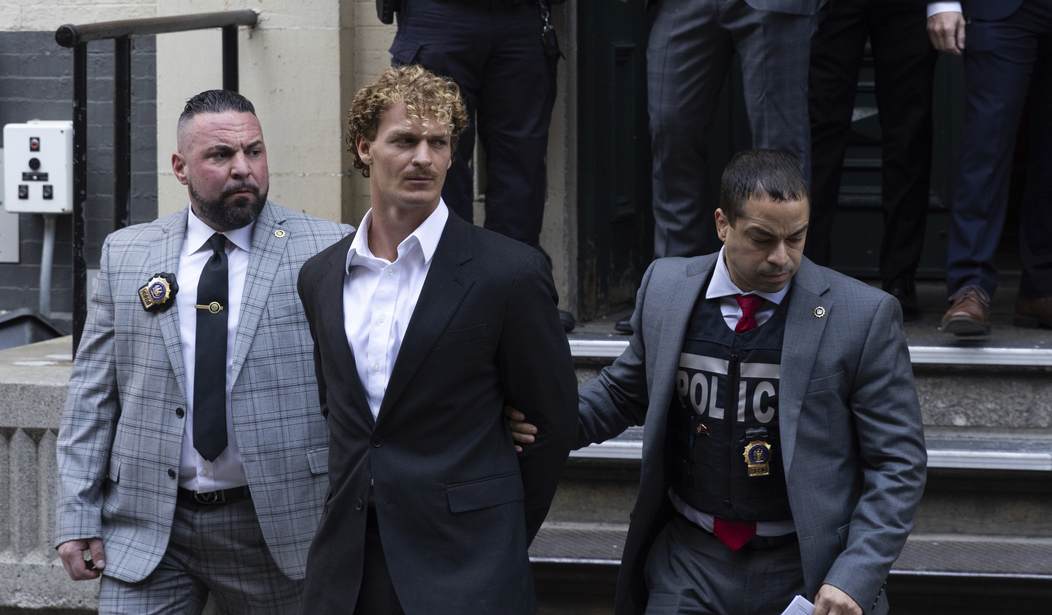The saga of Ryan Carson, murdered radical leftist activist in New York, now includes an alleged suspect in custody, but the legacy media is attempting to hide his identity despite it being readily available.
According to the New York Post, the suspect is 18-year-old Brian Dowling, a black male who lived on Lafayette Avenue. Police found evidence of the murder in Dowling's home, including the dark shirt he wore Monday and the suspected murder weapon. He's currently being charged with second-degree murder and criminal weapons possession according to the NYPD.
The Post was good enough to provide photographs of Dowling which are now being circulated around the internet.
I guess since @CBS won't show the face of the guy who allegedly murdered Ryan Carson, I will. pic.twitter.com/pQsz45D6at
— Brandon Morse (@TheBrandonMorse) October 5, 2023
Yet, bizarrely, CBS decided it needed to blur out Dowling's face.
Why is CBS blurring out the face of suspect who allegedly killed far-left activist Ryan Carson?
— The Post Millennial (@TPostMillennial) October 5, 2023
pic.twitter.com/z64g2swwCV
If this was a common practice for CBS when it came to all suspected criminals then perhaps this wouldn't be that big of a deal. However, CBS had no such compunction to protect the identity of a person accused of murder when it came to one Daniel Penny.
You may recall, Penny as the 24-year-old Marine who defended a New York subway car of people against Jordan Neely, a crazed homeless man who was becoming erratic and violent. Penny put Neely into a chokehold until he passed out then put him into a recovery position so that Neely would be no worse for the wear. Neely ended up dying anyway and Penny would be arrested for murder.
During his arrest, CBS made no effort to blur Penny's face. In fact, it was plastered everywhere.
CBS: Blurs the face of Brian Dowling, who is being arrested for murder after stabbing Ryan Carson.
— Grand Old Patriots🇺🇸 (@GrandOlPatriots) October 5, 2023
Also CBS: Openly broadcasted Daniel Penny before his trial. pic.twitter.com/2Kf8xOhwKN
The question is why the double standard?
You could say that it's because Dowling is only 18 and while this technically makes him an adult, perhaps CBS is attempting to practice judicious protection for someone so young.
So then the question has to be asked why they didn't do that for Kyle Rittenhouse, a minor.
Many have pointed out that race is likely a factor as Penny and Rittenhouse were both white and Dowling is black. Is race likely the reason for the difference in coverage?
Possibly.
Many networks take cues from various organizations about how they cover the news, and this includes the Poynter Institute. You may recall this organization, which bills itself as the "world's most influential school for journalists" is a biased media organization that created a list of "unreliable" sites that was primarily made up of right-leaning news organizations with RedState included.
The Poynter Institute is best known as the owner of the heavily biased PolitiFact. In April, Poynter was exposed as being paid by the federal government to teach government-funded journalists about "unbiased" reporting. As Newsbusters pointed out, Poynter's people only claim to be unbiased but demonstrate incredible prejudice against center-right journalism and news organizations. This includes telling CNN they shouldn't move to the center because "Sometimes, the other side shouldn’t be given a voice, particularly if that side’s argument is based on lies or pushes harmful agendas."
Poynter's training includes not detailing the race of a criminal if they're black or brown because, according to the institute, it fosters systemic racism:
Kelly McBride, who chairs the Craig Newmark Center for Ethics and Leadership at Poynter, said, “Local news reporters have amplified narratives that connect Black and brown communities to crime. As a result, we have fostered systemic racism through our crime coverage.”
It’s within our power as journalists to break that cycle. We don’t need to publicize the crime blotter simply because it fills airtime or generates clicks. We can decide that if we’re covering an arrest, we will follow the case through to its conclusion. We can evenly apply racial descriptors. If a defendant’s race is mentioned, should the prosecutor’s race also be mentioned? What about the race of the judge and the people sitting in the jury box? Every decision we make about the details we include — and what we exclude — sends a message to our audience.
The Poynter Institute is clearly very influential, helping to define even how our government perceives "bias" in journalism. With legacy media tightly in bed with the government to the point where it's instructing state-funded journalists, there's little doubt that the Poynter Institute has something of an influence on how certain stories are covered in corporate media circles.
While there is currently no direct tie to the Poynter Institute and the decision to blur Dowling's face, it seems like a very likely connection as to why it happened for him but not Penny or Rittenhouse. This would mean that the legacy media is covering stories differently depending on the race of the person in question.













Join the conversation as a VIP Member